Much to Observe and Even More to Learn From the Lead Up to the American Presidential Election.
The Ever-Changing Issues of the 2020 US Presidential Election
I write this opinion piece as one of many Australians currently paying close attention to politics in the United States.
The 2020 US Presidential election was anticipated as a judgment on President Trump’s unorthodox presidency. The issues include the unanswered questions about Trump’s connections to Russia’s interference in the 2016 US Presidential elections and his close relationship with Putin. Evidence of his past extramarital relationships, hush money paid to a porn star, and his lewd comments about women, inexplicably, (at least to the rest of the world), appear not to alienate his evangelical supporters.
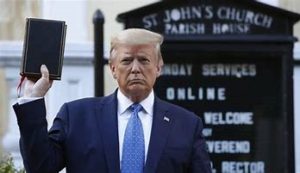
Trump’s use of a Bible and a church as props in his fight with the Black Lives Matter movement outraged many Christians and others.
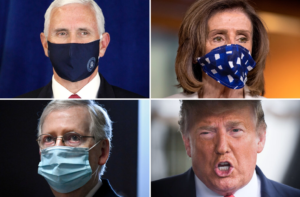
In spite of his delayed response and mixed messages regarding preventative measures, Trump still maintains that the death toll of ‘only’ 200,000 proves that he did ‘very well’.
More recently, the November 3 election has also come to be seen as a test of Trump’s handling of Covid-19, and his response to the ‘Black Lives Matter’ movement.
In recent weeks, thanks in part to Biden’s often inept reliance on teleprompters, and a growing perception that he is a puppet of liberal Democrats, the election is increasingly being presented as a choice of the lesser of two evils (or ageing incompetents).
Many, including Democrats, question whether Biden is really the best candidate the Party could identify to oppose Trump.
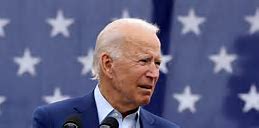
Photo: The Daily Caller
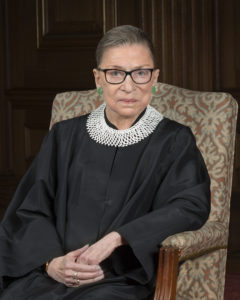
Photo: The late Justice Bader Ginsburg, 2016 Portrait
As if those matters were not sufficient, the death of Supreme Court Justice, Ruth Bader-Ginsburg last Friday, has made the President’s nomination and the Senate’s confirmation of Justice Bader-Ginsburg’s replacement on the Supreme Court the most prominent issue in the lead-up to the election.
Now, Trump refuses to give an assurance that he will peacefully hand over power should he lose the election.
Only Bernie Sanders seems to acknowledge that the answer lies in having an independent body oversee the election. That an independent umpire is required is taken for granted in other democracies. American divisive partisanship makes that country the glaring exception.
Voting for the Lesser of Two Evils
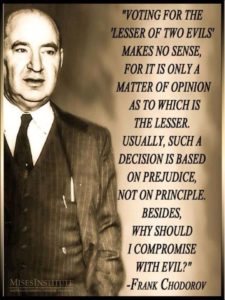
Photo: Pininterest
The prospect of voting for the lesser of two evils seems unproblematic, at least to those of us accustomed to compulsory voting.
However, in the US, where voting is voluntary, some media commentators and religious groups are arguing that when faced with a choice between two evils the moral and appropriate response is not to vote at all.
As the casting of fewer votes would most probably favour Trump, it may well be that such a stance will also receive some support from Republican leaders as some Commentators suggest that such a stance is even held by some Democrat voters.
I would argue that this reason for not voting (and especially by Democrats) is naive. It not only plays into the hands of the incumbent President but would also distort the significance of the election outcome in terms of the American people’s approval or disapproval of the President and his policies.
Irrespective of what voters may offer as their rationale for not voting, not casting a vote, I suggest, reflects a lack of desire to alter the status quo. So, even though a potential voter may argue (and some have) that voting for the lesser of two evils is still voting for evil, by not voting, whether they intend to or not, they will still be saying, ‘I don’t mind if Trump stays for another term.’
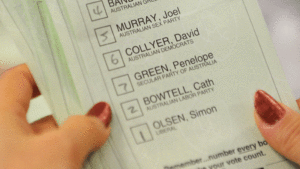
Preferential Ballot Paper used in Australian elections for the House of Representatives.
Perhaps my view is coloured by the Australian system of preferential voting, in which the winning candidate is either one who is the first choice of a majority of voters, or one who, having failed to secure a majority of first preference votes, gets over the line after being allocated second, third etc preference votes cast for candidates with the fewest votes. Consequently, the winner will not necessarily be the person who gains the largest number of first preference votes. But the winner will be the least unpopular candidate.
Are Non-Americans Entitled to Express Views on the Presidential Election?
On occasion, I’ve run into Americans (usually online), who have responded to my views on US politics by letting me know in no uncertain terms to ‘butt out’ (or in more colourful words to that effect). On occasion, I must confess to holding similar feelings, when I read foreign commentary on Australian politics that clearly misconstrues how our political system works.
Having said that, I still propose to address a few of the many reasons why Australians should feel entitled to pay close attention to and express their views on, the US Presidential election.
Implications for Non-Americans
First, the outcome of the November 3 election will not only affect Americans, it will also affect the rest of the world.
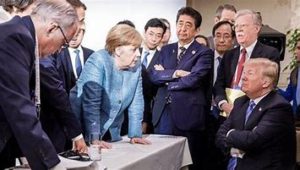
Under Trump, America has moved from world leader to stubborn and perplexing dissenter.
Many of us are concerned that a Trump re-election will further destabilise the world, force allies like Australia to take on China, undermine steps being taken to address global warming, and will continue to fuel the growth and spread of radical right-wing groups, as illustrated by the growth of QAnon in Australia illustrates.
Secondly, Australians have much to learn from the lead-up to this year’s US presidential election.
Towards Becoming a Republic
This is particularly the case as the reign of Queen Elizabeth II draws to its inevitable close, and as we once again consider whether it’s time for Australia to become a Republic. Our legal and political structures are based on both the British Westminster System and on America’s constitutional federation. If we were to become a Republic we would have to at least consider adopting further trappings of the American political and legal structures.

The ARM is campaigning once again and counting on a significant increase in public support after Queen Elizabeth II passes away.
Despite the misleading and unfounded spin of Australian Monarchists, the 1999 Referendum on whether Australia should become a Republic, failed, not because Australians indicated a preference to remain a constitutional monarchy, but because we couldn’t agree on how our new head of state would be chosen.
Some of us continue to oppose the notion of a popularly elected Australian President. In large measure, this opposition flows from a concern that the addition of a popularly elected head of state would create two parallel and potentially conflicting political power bases each with its own popular mandate. Differences between popularly elected Trump and Congress give some indication of what we could expect.
Such feared conflict would almost certainly eventuate if while electing a President/Head of State, we also retained the Westminster System of a Responsible Government. In this form of government, inherited from Britain, the party or parties that secure a majority of seats in the House of Representatives, form government, and their elected members choose the Prime Minister and other Ministers (the equivalent of the Secretaries appointed by the US President).
The fact that the present Australian Representative of our head of state is chosen by the government and clearly does not have the direct mandate of the people, may at first glance appear undesirable and undemocratic. However, this criticism matters little when the neutral role of the Governor-General is taken into account and recognised as a crucial stabilising factor.

Queen Elizabeth II with Sir Peter Cosgrove, Governor-General (2014-19)
Our current head of state is Queen Elizabeth II, in her capacity as Queen of Australia. In practice, the Queen’s role in Australia is undertaken by her representative, the Governor-General. While the role of our head of state is largely ceremonial, she or he performs a crucial role by providing a safety net in the event of a breakdown in constitutional conventions (sometimes described as gentlemen’s agreements), which, rather than binding constitutional provisions, largely determine the contemporary structure and practice of Australian federal politics.
Observing the Corresponding structures and procedures of the US republic and democracy, as that nation nears a crucial presidential election, is not proving to be the exercise in admiration or envy that it once may have been. Instead, it is more of a learning exercise on what to avoid.
Money Elects

Owning a gold-plated apartment apparently excludes good taste.
Viewed from a country that takes measures to ensure that lack of funding does not prevent a candidate from competing in an election, the hundreds of millions of dollars currently being spent in the US election campaign seems indecent. Apparently, in order to be successful, a US presidential candidate has to be filthy rich or backed by one or more billionaires. This practice appears to account for US candidates being on the whole very elderly men who see the Presidency as their final trophy. Few would suggest that Trump or Biden are in their prime – yet they are put forward as the short-listed candidates for the most powerful position in the world.
Adversarial Litigiousness
A feature of American political and legal life, highlighted during Trump’s term as President, is American’s frequent recourse to the courts, not only in private and corporate matters but also in politics. However, this facet of American politics inexplicably coexists with a disinclination to ensure that courts are unbiased and divorced from partisan politics.
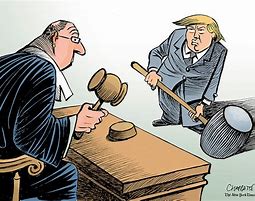
Trump refuses to accept judicial verdicts if they are contrary to his wishes. Photo: The New York Times.
Some of us struggle to understand America’s litigious society as our legal institutions are withdrawing from adversarialism, recognising at long last that adversarial proceedings rarely resolve disputes without further polarising parties.
Our Courts, and the increasing role of Tribunals, signal a preference for assisting parties reach win-win rather than win-lose outcomes.
In contrast, the partisan nature of adversarial hearings of political issues in the United States appears to exacerbate public division on social issues and politicise the judiciary.
The Appointment of Judges
In the High Court of Australia (the equivalent of the US Supreme Court) Justices are also appointed by the Government, albeit without the need to be confirmed by the Senate. In practice, it is the Attorney-General who undertakes a search for suitable appointees by consulting with state governments, law associations, law schools etc. A short list of candidates or the name of a proposed candidate is put to the Cabinet (senior ministers) for approval. Parliament’s only role relates to removing a Justice from office in circumstances specified in the Constitution.
As many as 20% of American voters, surveys reveal, consider a President’s appointment of federal judges to be a significant reason to vote. I am not aware of any evidence suggesting that any Australian voters also see the appointment of High Court judges as a significant electoral issue. There is every reason to believe that Australians are likely to see judges as being above politics and that irrespective of who appoints them, we expect our judges to make decisions on a non-partisan, non-ideological basis.
A Partisan Judiciary
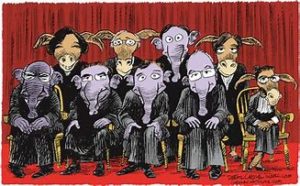
Such partisan categorisation of Supreme Court Justices would be unthinkable in Australia. Photo: Cagle Post.
Australians tend to be horrified by the blatant partisanship on display in the appointment of US Supreme Court Justices. President Trump appeared to not even pretend that the Justices of the Supreme Court Court are impartial when he expresses dismay at one of his appointees not making the decision he clearly expected.
In Australia, on the other hand, the appointment of a broad, representative bench appears to be taken much more seriously. While, on occasion a very conservative or progressive judge may be appointed, it is judges’ professional standing, merit, skill set, a court’s balance, as well as federal and gender representation that seem to determine who is appointed.
The absence of a Senate confirmation requirement in Australia ensures that judges are not quizzed on their views, such as whether they are pro or anti-abortion etc. It could be argued that without confirmation hearings, our judges are relatively anonymous and known as members of the Court rather than as individuals. We expect our judges to separate their personal views from their task of determining and applying the law. In this respect, I note that some of Australia’s most socially progressive judgments have been written by practicing Christians.

Justice Kavanaugh responding to intense questioning at his Senate Judiciary Committee confirmation hearing.
The partisanship dominating the appointment, confirmation and membership of US Supreme Court Justices is clearly further dividing a nation that appears to be nearing breaking point. It is sad to see a great nation in decline. The once leading champion of democracy now appears to have its own democratic institutions in tatters. This, however, cannot be blamed on subversion from outside the institutions of state. The blame clearly lies with social division fuelled by partisanship and the very institutions that were supposed to restrain power and provide checks and balances and restraints on power.
Not Only Entitled but Obliged to Observe and Comment
Australians and others observing America’s lead up to the November 3 presidential election have much to learn, especially about what to avoid in their own countries. Consequently, we must not only observe but also alert our fellow citizens to the lessons of an unfolding tragedy, that we all hope can be avoided.